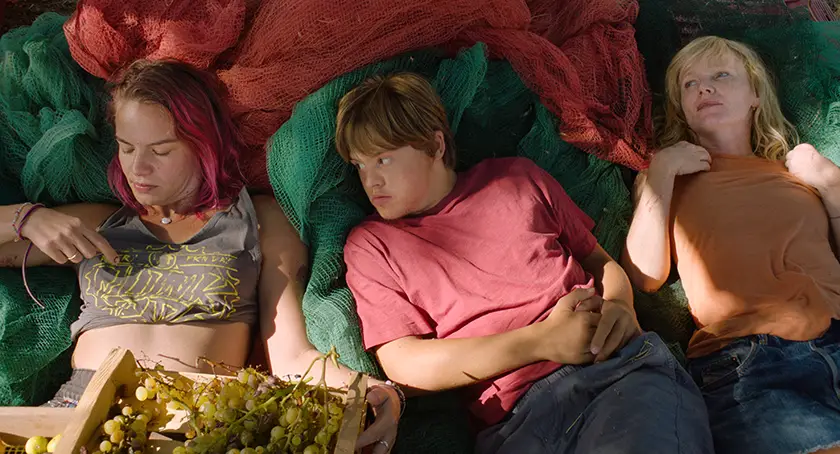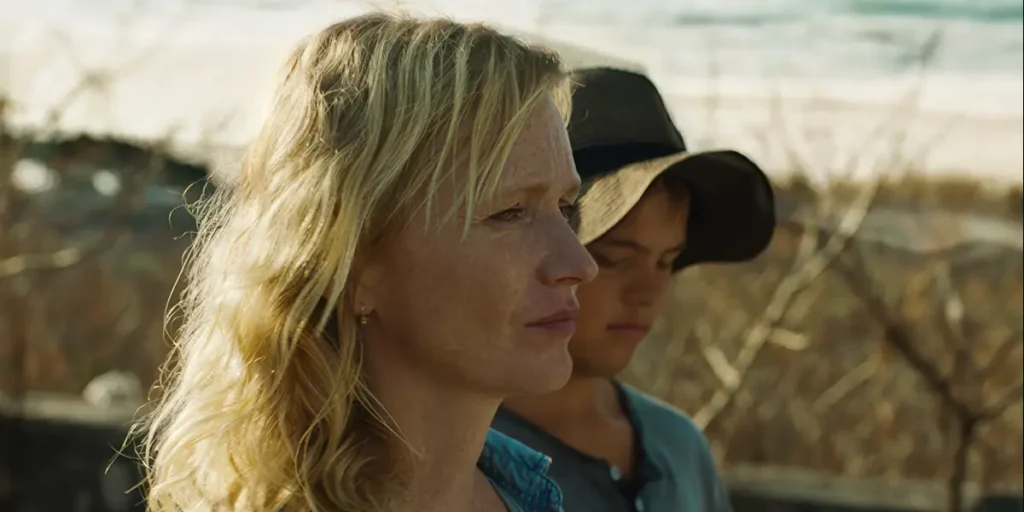Zuzana Kirchnerová’s Caravan gives dimension, nuance and grace to mothers serving as the sole caretaker for intellectually disabled children.
Director: Zuzana Kirchnerová
Genre: Drama
Run Time: 100′
Cannes Premiere: May 22-24, 2025
U.S. Release Date: TBA
U.K. Release Date: TBA
From the moment their children are born, mothers have extreme expectations placed on them. They are expected to be selfless, kind, caring, never tired and always overjoyed to help their children. While we can agree this is both unrealistic and outdated, for some reason, it’s extraordinarily difficult for society to break this methodology and give mothers the grace they deserve.
In Zuzana Kirchnerová’s directorial debut Caravan (Karavan), she aims to both break and correct this narrative by showing audiences a raw and real story of a mother doing her best. Caravan tells the story of Ester (Anna Geislerová), a single mother who is the sole caretaker for her 15-year-old son David (David Vostrcil), who is nonverbal and severely intellectually disabled. Ester and David are on a rare vacation, visiting a couple who are old friends of Ester’s who have a home near the beach in Italy. Petra (Jana Plodková) and Tommaso (Giandomenico Cupaiuolo) have two young daughters who fill their days with silly games and laughter.
Ester has a far more complicated relationship with David, as he often acts on impulses he can’t control. One morning, after David has had a particularly intense episode, Petra and Tommaso ask that Ester and David to stay in the old Caravan in the garden rather than the guest room of the house for the safety of their girls. Fed up with feeling like a burden and having to deal with their looks of pity, Ester ends up driving off in the Caravan to have a vacation free of the judgment of her old friends.

Along the way, she picks up the free-spirited and completely defiant Zuza (Juliana Olhová). Both Ester and David are completely enamoured with Zuza and the trio sets off south with no solid plan in mind. Ester finally feels like she has a reprieve from being David’s sole caretaker and, for the first time in many years, is able to think about what it is she wants.
Zuzana Kirchnerová’s directorial debut is a devastatingly beautiful look at a woman finding herself after years putting her needs aside in order to care for her son. It’s a story about rebirth and being reinvigorated by life’s unexpected moments rather than terrified by them.
Ester’s time with Petra and Tommaso reinforces her feelings of loneliness. She can’t help but envy their beautiful, carefree lives and the ways in which they can lean on one another for support. The three of them lived out their wild youth together, but while Ester grew into a life of sacrifice and constant devotion, it seems Petra and Tommaso still get to be some version of their young, carefree selves.
They just don’t understand David. With Caravan, Kirchnerová is diligent in showing both the good and bad moments David has. She doesn’t present him as this heavy burden on Ester’s life, because he’s not, but rather she presents the ways in which caring for an intellectually disabled child fundamentally changes the way you mother and live your life.
To create the nuance that David’s character deserves, Kirchnerová is adamant in showing his tender moments as well as his difficult ones. He loves his mother and admires her greatly. While she sleeps, he traces her features almost as if he’s committing them to memory. As he begins to fall in love with the effervescent Zuza, he does the same to her.

In that way, Caravan is a coming-of-age story for both David and Ester. While David is being exposed to new parts of the world and maturing before our very eyes, Zuza’s presence allows for a reawakening of Ester’s spirit, which has long sat dormant. Ester has finally found someone who understands David in the way she does and, in turn, sees her for all that she is.
Zuzana Kirchnerová’s Caravan is full of honesty, empathy and compassion for its main characters. It’s clear that Ester and David were crafted out of pure love and a desire to tell the stories of mothers and children that are often overlooked. Kirchnerová’s debut feature shows the selfless sacrifices mothers make for their children while also granting its main character the reprieve and grace she deserves.
Caravan (Karavan): Movie Plot & Recap
Synopsis:
Ester is the sole caretaker for David, her nonverbal, intellectually disabled son. While caring for him typically occupies every moment of her life, she is hopeful the vacation she planned to visit two old friends in Italy will be the perfect break from the intensity of her day-to-day life.
After David’s episodes prove too intense for Ester’s friends to handle, and for which they ask Ester and David to stay in the Caravan outside rather than in their home, Ester makes the executive decision to reclaim her and her son’s holiday.
Pros:
- Zuzana Kirchnerová is able to tell a compassionate and moving story that serves as a coming-of-age tale for both mother and son.
- An empathetic look at a mother’s sacrifice paired with introspective realizations about the ways in which we reinvent ourselves.
Cons:
- When presenting a character with an intellectual disability, there is a tight line to walk in showing the reality of day-to-day life and not being exploitative of their disability. While I believe Caravan handles David’s character with immense care, there are moments within the film that feel like they exist in a gray area of that spectrum.
Caravan (Karavan) premiered at the Cannes Film Festival on May 22, 2025 and will be screened again on May 23-24.

